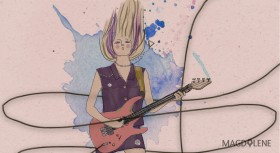A recent post in one of my favorite blogs “The Soshal Network” talks about how pressure tactics, bordering on bullying by the salespeople at an upper class department store, caused the blogger to buy cosmetics she did not want nor need. Neither could she really afford the stuff.
Well-written and hilarious, the blog post hit more than just my funny bone. For me, it also speaks of the not-funny-at-all connections between bad labor practices, commercialism and the control of women’s bodies, self-esteem and pocketbooks by the beauty industry.
As to bad labor practice, the blog post made me realize how I have been avoiding certain areas in my favorite malls because those are the areas where I am sure to get accosted by pushy and persistent sales people wanting me to try all sorts of things for “free.”
Of course, “free” is just the gimmick by which they lure you into a sales pitch that can go on and on despite their assurances that it was only going to take “5 minutes of your time.” As the blog notes, salespeople have got their spiel down pat. What borders on bullying and illegal detention comes about in ways you will not notice. In the end the victim, in a bid to regain her freedom, ends up bribing the salesperson through the purchase of products she only agreed to “try for free.”
These people are on commission and, in some of the worst cases, only earn if they sell. Thus their lack of ethics and good manners really comes from economic need. In the end those of us who, out of courtesy or kind-heartedness give in to their desperate manipulations, end up having hardened hearts and no sense of solidarity with these workers.
For those who believe that love can also be defined as that which allows solidarity and compassion in public life, this labor practice negates our capacity to love and is therefore pure evil.
However, this practice also points out that capitalists can sometimes work at cross-purposes to each other. Surely, high-end cosmetic brands in a classy department store want to be seen as products for the genteel. This is hard to do if your salespeople act like junkyard dogs – even if the dog happens to be a foreigner with white skin, who preys on the colonial mentality of Filipinos.
I also wonder whether other stalls near these swarms of desperate bullies are happy with the fact that people like me avoid the general area where they are located.
The solution is to stop this inhuman labor practice, another argument for the need for government regulation of the “market,” even if only to help capitalism itself.
Harmful, useless, dangerous products
In the area of beauty products, however, the problem is also the underlying dictates about what women (and increasingly men) should be, do and look like in order to be desirable. Those dictates involve the use of useless and often harmful products. Yes. Let me say it again. Useless.
Cosmetics claims for achieving a less wrinkled, whiter, glowing person are largely unproven. Many times, too, the cosmetics ask you to plaster your body with all sorts of chemicals that are not tested for safety and are later proven to be harmful.
But there is something deeper going on here because we are slowly taught to find desirability along lines dictated by the beauty industry as an area for self-affirmation, self-control and self-discovery. According to the beauty culture, happiness and love can be found in those cosmetics, dieting techniques, fashion apparel and other commercial goods. We need only choose correctly and apply these things rigorously. Little wonder that the fashion mavens have all taken up the feminist ideal of liberation, as long as women remain free to choose to be thin and beautiful and well made up.
But there lies an empty promise.
As Liz Jones, the editor credited with building up one of the most renowned beauty magazines said upon her resignation in 2001, said, “I had reached the point where I had simply had enough of working in an industry that pretends to support women while it bombards them with impossible images of perfection day after day, undermining their self-confidence, their health and hard-earned cash”.
That article is worth a read, because it describes the tremendous push back she received merely because she wanted fashion magazines to stop featuring the unhealthy anorexic models that had become the industry standard.
Impossible dream
That practice of pushing a regimented view of beauty has continued. It is so because the anorexic, unwrinkled, tall and white standards of beauty create an endless need for products promising what cannot be attained. It has created a US$426 billion per year industry that continues to grow by leaps in bounds even in times of economic downturn.
What it has also created is tremendous amounts of dissatisfaction in women and young girls about themselves. Thus an article in The Guardian notes that in the UK, “girls as young as five are worrying about their size and appearance, and that one in four seven-year-old girls have tried to lose weight at least once.” The article goes on to cite more data from the British Social Attitudes Survey that “show a preoccupation with body image affects women throughout their lives, not just in their youth. It holds women back by eroding their confidence both at work and socially.”
New research coinciding with Body Confidence Week found that almost 10 million women in the UK “feel depressed” because of the way they look and 36 percent avoid exercise because of insecurity about their looks.
A classic in this area is Naomi Wolf’s 1992 book, “The Beauty Myth” that talks abut how women’s victories in fighting for equal work, equal pay and generally, equal rights is slowly being eroded by this new form of control that is far more insidious then legal measures of discrimination.
True fashion
Do not get me wrong.
I am not against expressing one’s personality in the way we dress and in the use of body adornment from make-up to jewelry to tattoos. I am not judgmental nor envious of those who have what has been called in the body acceptance movement “thin privilege” – though I do wish they would be more sensitive in the way we ask people to be sensitive about class and gender privilege.
What I do condemn is the bullying and stigmatization of those who cannot conform – the big bodied, the ones who dress in ways associated with the opposite gender or who mix up gender codes, and the ones who don’t care to obey the standards.
As it stands, beauty standards have become totalitarian in their lack of diversity and are no more a source of real self-expression than the choice of choosing between one devastatingly unhealthy soda brand over the other in order to find fulfillment.
If the beauty industry is really going to be about the majority of women, it should be reset completely. Hopefully there are increasing numbers of people within it, who, like Liz Jones, are trying to do that.
In the meantime, I suggest women who are not served by it live off the beauty grid and enjoy the true pleasures of self-expression in the ways we eat, dress, adorn or not adorn. Eschew the big brand names and their ridiculous marketing gimmicks. Wear the clothes and adornments you like and that affirm you may likely be local, unknown and affordable.
After all, being your happy and self-accepting self may not pass the beauty standards, but it is the fashion statement every woman should be making.
Sylvia Estrada Claudio is director of the University of the Philippines Center for Women's Studies.
This story was first published in Rappler.com, a Manila-based social news network where stories inspire community engagement and digitally fuelled actions for social change.








Comments